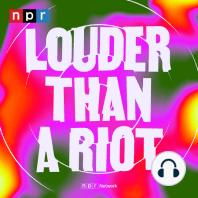52 min listen
'Stay In The House': Bobby Shmurda (Pt 2)
ratings:
Length:
46 minutes
Released:
Nov 12, 2020
Format:
Podcast episode
Description
Two young men grow up just blocks apart, each with aspirations to make it big. But while Bobby Shmurda sees his dreams come true, Bryan Antoine is killed by members of Bobby's crew. This is the story that lingers between the lyrics of Bobby's viral hit, "Hot N****." We talk to the family grieving Bryan's loss and review hours of incriminating GS9 phone calls. How does the true story behind the song complicate stereotypes about gang affiliation? And what does the pursuit of justice mean in a neighborhood where labels like "victim" and "perpetrator" can be interchangeable?
Released:
Nov 12, 2020
Format:
Podcast episode
Titles in the series (28)
The Conspiracy Against Hip-Hop: Why are hip-hop and mass incarceration so entangled in America? How did they become that way? A mysterious letter sends us back in time to find out. by Louder Than A Riot
